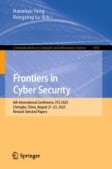Search
Search Results
-
Zero-Knowledge Proof
Zero-knowledge proofs are techniques to verify claims without revealing the information itself. In this process, a “prover” shares proof of their...
-
Sok: vector OLE-based zero-knowledge protocols
A zero-knowledge proof is a cryptographic protocol where a prover can convince a verifier that a statement is true, without revealing any further...

-

-
Lookup Arguments: Improvements, Extensions and Applications to Zero-Knowledge Decision Trees
Lookup arguments allow to prove that the elements of a committed vector come from a (bigger) committed table. They enable novel approaches to reduce...
-
Non-interactive Zero-Knowledge from Non-interactive Batch Arguments
Zero-knowledge and succinctness are two important properties that arise in the study of non-interactive arguments. Previously, Kitagawa et al. (TCC...
-
Zero-Knowledge Systems from MPC-in-the-Head and Oblivious Transfer
Zero-knowledge proof or argument systems for generic NP statements (such as circuit satisfiability) have typically been instantiated with...
-
An efficient quantum non-interactive zero knowledge proof for confidential transaction and quantum range proof
This paper investigated the Bitcoin blockchain and other crypto currencies confidential transaction techniques for cryptographic commitment in a...

-
Strong Batching for Non-interactive Statistical Zero-Knowledge
A zero-knowledge proof enables a prover to convince a verifier that $$x \in...
-
Zero-Knowledge Functional Elementary Databases
Zero-knowledge elementary databases (ZK-EDBs) enable a prover to commit a database D of key-value (x, v) pairs and later provide a convincing answer...
-
Zero knowledge proof and ZK-SNARK for private blockchains
Comprehensive adoption of distributed ledger technology and blockchain in enterprises might disrupt financial and other sectors. At the same time,...
-
Efficient Zero-Knowledge Arguments and Digital Signatures via Sharing Conversion in the Head
We present a novel technique within the MPC-in-the-Head framework, aiming to design efficient zero-knowledge protocols and digital signature schemes....
-
Zero-Knowledge Arguments for Lattice-Based Accumulators: Logarithmic-Size Ring Signatures and Group Signatures Without Trapdoors
An accumulator is a function that hashes a set of inputs into a short, constant-size string while preserving the ability to efficiently prove the...

-
A zero-knowledge proof of transpose of a matrix of finite field elements
Interactive zero-knowledge arguments for some fundamental linear algebraic operations have been formulated. But those arguments cannot be used for...
-
Zero-knowledge proofs for set membership: efficient, succinct, modular
We consider the problem of proving in zero knowledge that an element of a public set satisfies a given property without disclosing the element, i.e.,...

-
Zero-Knowledge Predicates for Hashing to Prime: Theory and Applications
Hashing to prime in zero-knowledge takes as input a committed secret \(a\)...
-
Efficient Non-interactive Zero-Knowledge Proof for Graph 3-Coloring Problem
Zero-knowledge proof (ZKP) has a crucial role in the construction of cryptographic protocols and privacy protection. One of the core research...
-
Weak Zero-Knowledge via the Goldreich-Levin Theorem
Obtaining three round zero-knowledge from standard cryptographic assumptions has remained a challenging open problem. Meanwhile, there has been...
-
Speed-Stacking: Fast Sublinear Zero-Knowledge Proofs for Disjunctions
Building on recent compilers for efficient disjunctive composition (e.g. an OR of multiple clauses) of zero-knowledge proofs (e.g. Goel et al....
-
Zero-Knowledge Arguments for Subverted RSA Groups
This work investigates zero-knowledge protocols in subverted RSA groups where the prover can choose the modulus and where the verifier does not know...
-
Commitments with Efficient Zero-Knowledge Arguments from Subset Sum Problems
We present a cryptographic string commitment scheme that is computationally hiding and binding based on (modular) subset sum problems. It is believed...
